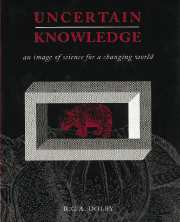Book contents
- Frontmatter
- Contents
- Preface
- 1 Introduction
- Part I The nature of science
- 2 Levels of cognitive activity
- 3 Facts in frameworks
- 4 Rationality, irrationality, and relativism
- 5 Knowledge and reality
- 6 A new account of the scientific process
- Part II Does science have distinctive qualities?
- Part III Changing science in a changing world?
- Appendix: Summary of cases of marginal and disputed science
- References
- Index
6 - A new account of the scientific process
Published online by Cambridge University Press: 28 January 2010
- Frontmatter
- Contents
- Preface
- 1 Introduction
- Part I The nature of science
- 2 Levels of cognitive activity
- 3 Facts in frameworks
- 4 Rationality, irrationality, and relativism
- 5 Knowledge and reality
- 6 A new account of the scientific process
- Part II Does science have distinctive qualities?
- Part III Changing science in a changing world?
- Appendix: Summary of cases of marginal and disputed science
- References
- Index
Summary
Introduction
Traditional philosophical theories of scientific method concentrated on explicit systems of rationality and left out reference to the informal individual and social rationality which sustains them. The sociological turn in science studies instead made science into just another form of social life, the local complexities of which can be described and understood in the same terms as any other social practice. This chapter seeks to provide a theory of how science combines explicit rationality with individual and social informal rationality. The coherent fragments of explicit rationality which science has actually produced are provisional drafts of current philosophical ideals of knowledge. They are generated as the output of a nested set of cyclical activities. The cycles go on at every cognitive level, the results affecting subsequent repetitions. The knowledge content of science is continually being updated and revised by the interaction of the various loops of information flow. The theory moves goes beyond description of the epistemological practice of science into the construction of a ideal account that might also function prescriptively.
If we look at science as a whole, we may idealise the process in terms of the general form of a cycle which moves around the following stages:
Matching factual claims to reality.
Matching theories to factual claims.
Reconciling theories in networks of understanding.
Reworking reality in the image of our understanding.
Every cognitive level is (or should eventually be) involved in this cycle. The process is sustained within a complex social system and is driven through its changes by (socially acquired) individual motivation.
- Type
- Chapter
- Information
- Uncertain KnowledgeAn Image of Science for a Changing World, pp. 129 - 156Publisher: Cambridge University PressPrint publication year: 1996



